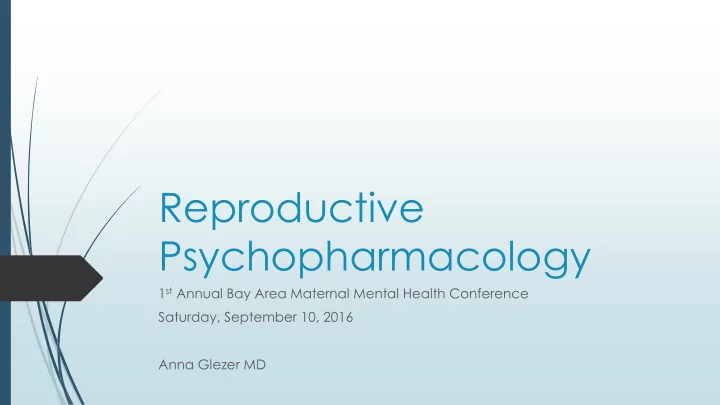

Reproductive Psychopharmacology 1 st Annual Bay Area Maternal Mental Health Conference Saturday, September 10, 2016 Anna Glezer MD
Disclosures None
Fear of Medication in Pregnancy
Pregnant patients use medication! Dichotomy between what is beneficial for mom versus baby Forgetting to weigh risks of untreated illness versus medication rather than just use versus nonuse of medications Pregnant patients are #1 under-represented patient population in medical research 2/3 take at least one prescription medication 1/3 take psychotropic medication
Medication Discontinuation Effects Relapse Rates of recurrent are high! Consequences of recurrence are serious Withdrawal
Safety Across Stages Malformations (1 st trimester) or miscarriage Obstetric and neonatal outcomes Long term neurodevelopmental consequences
Most commonly prescribed psychotropic in pregnancy: SSRI Indications: mood, anxiety Well tolerated w/r/t SEs Most available safety information in pregnancy Mechanism of action
SSRIs and Malformations or Miscarriage No increased risk of malformations No increased risk of miscarriage
SSRIs and PPHN Lower than initially believed Risk attenuated when depression accounted for
SSRIs and Autism No causal relationship has been proven
SSRIs and Neonatal Adaptation Poor Neonatal Adaptation: Jittery, tremulous, respiratory difficulty, tremor, difficulty feeding, irritable. 20-30% of infants Taper?
SSRIs and Development No cognitive differences Possible non-clinically significant differences in gross motor development and language Age 7
SSRIs and Breastfeeding Crossing into milk at <1-8% Levels low in infants if detectable
Other antidepressants/antianxiety agents SNRIs Bupropion Trazodone Mirtazapine TCAs
Sleep Aids Zolpidem Diphenhydramine Melatonin Benzodiazepines
Mood Stabilizers: Lamotrigine Registry data: No increased risk of malformations, except for one older North American registry suggesting increased risk of oral clefts (absolute risk of 0.9% according to that data) Well tolerated, few side effects, weight neutral Baseline level and repeat 3 rd trimester Postpartum dose adjustment High rate of crossing into breast milk Interaction with contraceptives Long-term data
Other Mood Stabilizers Lithium Carbamazepine/oxcarbazepine Valproic acid Lesser used: gabapentin, topiramate
Antipsychotics Typicals Older atypicals Newer atypicals
Stimulants Prescribed stimulant medications versus methamphetamine No malformations Obstetrical outcomes
Complimentary medications Folic acid Omega-3s Placenta encapsulation
Novel treatments SAGE 547 Preliminary, pilot study noted significant improvement in symptoms of postpartum depression Affects GABA Next step: placebo controlled drug trials
Take Home Points For many women, psychotropic medication is an important part of treatment during pregnancy and postpartum For each woman, it is an individual discussion about her particular risks, benefits, and alternatives of taking versus not taking medication
Resources Mind Body Pregnancy MGH Women’s Mental Health Center Lact Med MothertoBaby.org
Recommend
More recommend